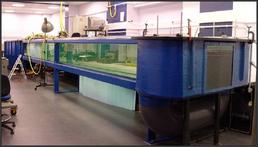Seminar 8th March 2011 11 a.m. University of Southampton, Building 4 (Law) Room 4043
Modelling Extreme Ocean Waves, with Implications for Wave-Structure and Wave-Vessel Interactions
Professor Chris Swan
Imperial College London
- Web page
- http://www3.imperial.ac.uk/people/c.swan
- Categories
- Oceanography
- Submitter
- Petrina Butler
Fluid Structure Interactions Research Group Seminar
We are pleased to announce that Professor Chris Swan from the Department of Civil & Environmental Engineering at Imperial College London will visit us to give a presentation as part of the Fluid Structure Interactions Research Group Seminar series.
Abstract
Surface water waves are a dominant feature of most marine environments, including both deep-water offshore and shallow-water coastal locations. Their description forms the basis of numerous environmental models and the loads they impart dictate the design and safe operation of all manner of marine structures and vessels. Within severe storms, the occurrence of extreme waves has long been recognised and our ability (or inability) to model them the subject of much research. In recent years attention has been focused on the largest of these extremes; the occurrence of so-called freak or rogue waves representing events that lie outside accepted statistical predictions.
The seminar will consider these events and will outline new modelling procedures capable of describing the evolution of abnormally large waves. These models allow deterministic engineering calculations and also provide guidance as to those sea states in which unexpectedly large waves may occur. The key factors are found to be the nonlinearity (or steepness) of the sea state, its directional spread and the underlying spectral bandwidth. Confirmation of the importance of these effects is provided by laboratory observations of both large individual wave events and long random wave simulations. The seminar will conclude by considering the practical implications of these waves for both fixed and floating structures. The examples will provide evidence of unexpectedly large loads, of local increases in the maximum crest elevations and, above all, the occurrence of wave impacts and green water inundation.
Biography
Chris Swan is the Professor of Hydrodynamics and Head of the Fluid Mechanics Section within the Department of Civil & Environmental Engineering at Imperial College London. His main research interests relate to the description of surface water waves and their interaction with both fixed and floating structures; the emphasis of the latter being the calculation of fluid loads, the possible onset of dynamic response, the occurrence of wave impacts, the quantification of wave-in-deck loads and the behaviour of vessels in close proximity. Across this work, improved physical understanding has been achieved using a combination of detailed laboratory observations and advanced numerical modelling. He has published over 90 technical papers, been the lead investigator on numerous research grants and projects and has successfully supervised 21 PhD students to completion. In recent years he has overseen the creation of a new hydrodynamics laboratory with unrivalled research facilities and participated in a number of high-profile joint-industry projects, several of which are on-going. His present research group consists of 7 research students, all involved in a combination of experimental and numerical modelling, covering applications from the deep water offshore environment to shallow water coastal locations.
A guest of Thomas Lloyd, Fluid Structure Interactions Research Group.
